Welcome to today’s edition of ShentonSTAGE Daily, which returns to normal service this week after my Provincetown hiatus (which I interrupted this time last week for a special one-off PTown edition). I’m actually here a day earlier than I expected, too.
My time there ended with an (almost literal!) shit show, as a big storm a week ago yesterday caused a sewage outage that meant the town closed all restaurants last Thursday and Friday and the authorities urged less toilet flushing and showering to enable them to repair it.
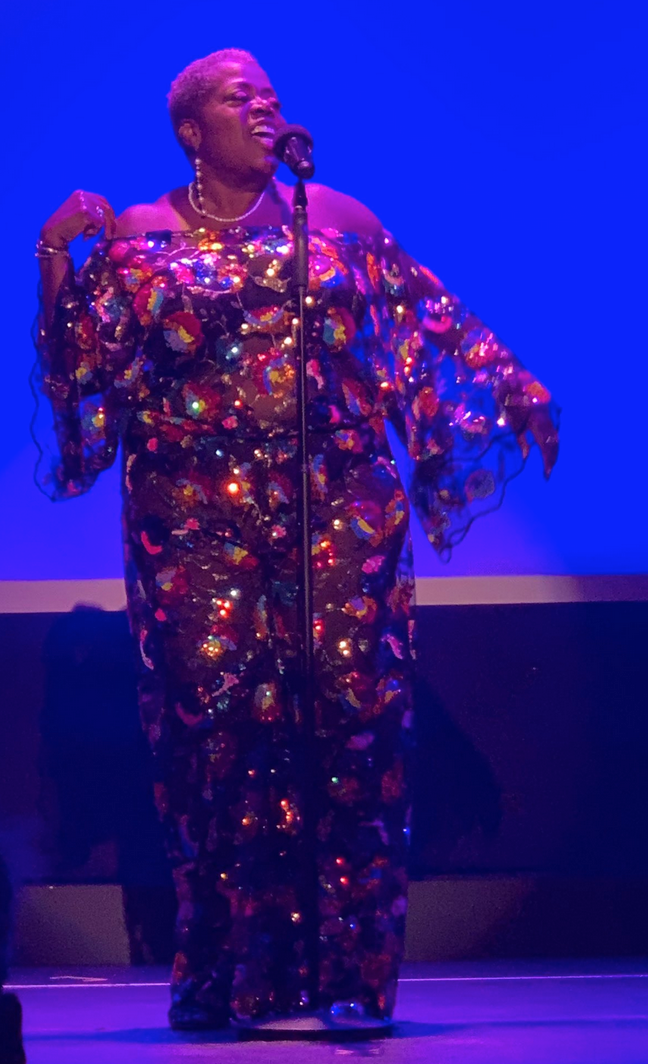
But I saw plenty of GREAT shows there, including three featuring Seth Rudetsky hosting Broadway legends Donna McKechnie and Chita Rivera, plus another featuring Rachel Bay Jones, that I’ve already written about here; my stay ended with Seth in song and conversation with another irrepressible veteran, Lillias White, whose 40 year career on Broadway has spanned from taking over in the original production of BARNUM in 1981 and THE LIFE (for which she won a Tony Award in 1997) to HADESTOWN, her newest credit in which she will take over from Andre de Shields from September 13. She yet again proved why she is one of Broadway’s most briliant vocalists and personalities.
And Rudetsky’s series, presented by the Arthouse’s artistic director Mark Cortale, is absolutely essential to the PTown summer experience. I’m so sorry I’m not here all summer to see them all! Still to come are Audra McDonald, Jessica Vosk and Beth Malone (on August 28, September 4 and September 30/October 1 respectively); I wish I could return!
A shit show looms for the UK arts economy, too….
In THE TIMES last Friday, RIchard Morrison penned a worrying column that predicted grim prospects for the arts this autumn, as the twin effects of inflation and the energy crisis kick in.
As he wrote,
“I’ve contacted some of Britain’s arts leaders to get their off-the-record thoughts, and the consensus is this. First, as one orchestral boss put it: “The outlook is as grim as I’ve ever known.” It’s hard to judge box-office trends during a blistering hot summer, which is why I don’t worry too much about rumours that most Edinburgh Fringe shows are playing to absolutely nobody, or that some BBC Proms are barely achieving 10 percent capacity. With the thermometer soaring to tropical levels, why would you want to take a sweltering Tube train to the Royal Albert Hall when every concert is live on radio?”
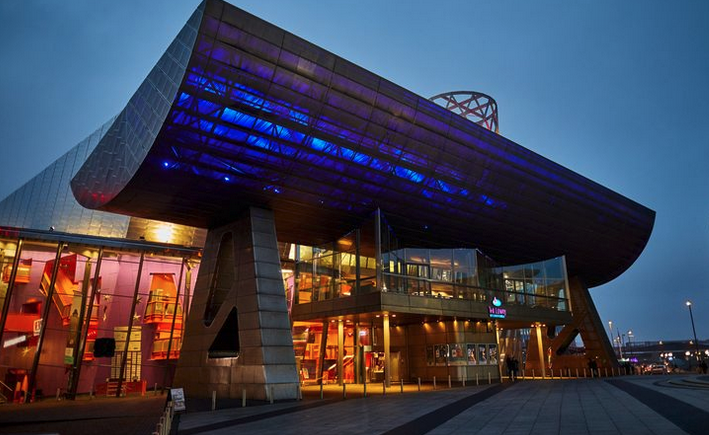
And he continued, “Nevertheless, most arts leaders admit that their advance takings for the autumn are down 25 to 35 percent on normal levels. “People are booking later, waiting to see reviews, determined not to waste money on bad shows,” one West End impresario points out. Maybe, but as the cost of living crisis intensifies the fear is that regular punters — those who used to go to two or three shows a month — will cut right back. Indeed, a new Ipsos survey has found that 37 per cent of respondents have already reduced their spending on cultural activities. Remember, too, that the cost of heating venues and running complex stage-lighting rigs is rocketing. Astonishingly, the annual electricity bill for the Lowry (pictured above) in Salford — one of England’s most important arts centres — is already 33 percent higher than its total Arts Council grant.”
Waiting for the reviews…..
The importance of reviews is affirmed, of course, by the annual anxiety at the Edinburgh Fringe as shows await them in order to help them promote their shows. But who is actually writing them?
In Edinburgh, an equal access festival where anyone can put on a show, it seems that anyone, too, can be a critic, and most of the critics whose star ratings (usually four or five stars) appear so indiscriminately on posters around town are not only names I’ve never heard of before, but from publications I’ve not heard of either.
In this context, the ‘legacy’ outlets — The Scotsman, The Guardian, The Times, even The Stage — carry an outsize influence, as their names actually carry some weight, but can be usefully bolstered by the meaningless ones on the line(s) below.
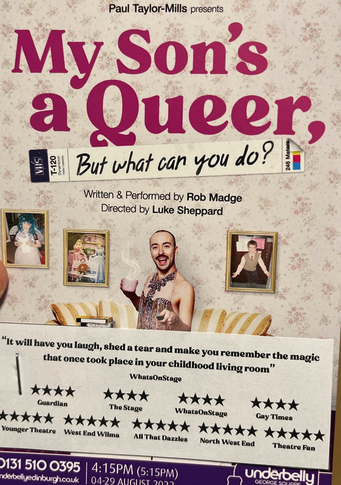
It’s interesting, too, that as those media outlets all clamour for attention, too, some have their own award offerings, from The Scotsman’s long-established Fringe First Awards to The Stage Awards to recognise what (their critics deem to be) the best shows of the festival are. (Pictured below is Samuel Barnett, receiving a Stage Award for his performance in Feeling Afraid As If Something Terrible Is Going to Happen, playing as part of the Roundabout season at Summerhall).
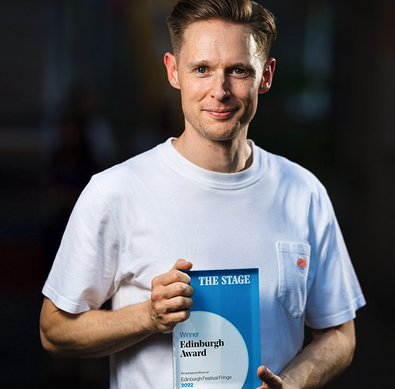
In this context, it is interesting to see The Stage’s editor Alistair Smith finally planting a flag in the sand for fair pay at the fringe, with a column last week that laid out that their awards “will only recognise performances within productions that pay all cast and crew fairly.”
This is a serious about-turn: when I publicly declared back in 2018, when I was still the paper’s contributing editor, that I would personally only review shows that paid actors and crew on the London fringe and elsewhere, I faced a fierce backlash that THE STAGE refused to pick up the reigns of, with one of its then-regular contributors Phil Wilmott — a director who has built much of his career on unpaid labour – saying it was an impossible standard to meet.
I’m glad that they’ve finally seen that the very act of choosing which shows to reward comes with responsibility to ensure that the actors are actually being paid, and not just in accolades.
Who writes the reviews? An A (plus) to Z(zzzzz) of current national theatre critics
As we get older, we inevitably lament the way things used to be. I fondly remember the days when I first became interested in theatre in the early 1980s — and reading the reviews that covered it. The critics I first loved were Irving Wardle in THE TIMES, MIchael Billington in THE GUARDIAN, Robert Cushman (followed by Michael Radcliffe) in THE OBSERVER, Sheridan Morley in PUNCH and Jack Tinker in the DAILY MAIL. (By the time I became a critic myself, Jack Tinker had died, and Cushman had returned to his native Canada — where he is still a critic today — but I got to know each of the others).
It used to be so much easier in those ‘old’ days: there were five daily national broadsheets (Times, Telegraph, Guardian, Independent and Financial Times, five daily tabloids (Mail, Express, Mirror, The Sun and Today), their Sunday counterparts, and the London Evening Standard, and later, the Metro.
Add in a few weekly titles — the listings mags, TIme Out, of course, plus What’s on in London and City Limits, and the New Statesman, The Spectator, Punch, and The Stage. And that was pretty much it in terms of outlets that covered theatre regularly. With some of the daily papers having second or even third stringers, it meant that the regular critical fraternity stretched to 20 or so named writers, plus some regular freelancers who could be found popping up in the listings mags and The Stage.
Then the internet arrived, and added outlets like WhatsOnStage and londontheatre.co.uk to the mix (both of which I contributed to for a number of years each). I also had over 11 years on the Sunday Express as well, and an even longer stint on The Stage (as critic, contributing editor and daily online columnist). I’ve also appeared in the pages of TIME OUT, THE GUARDIAN (mostly online) and THE OBSERVER.
Now, however, you find me mostly here on this site — one where I am publisher, editor and contributor, all rolled into one.
And yet there are many, many more critics — or aspiring critics — than there have ever been. But paradoxically, fewer than ever who I actually WANT to read, let alone RUSH to do so.
Here’s a handy primer for sorting the wheat from the chaff. And although I won’t ‘review’ them all, I’m happy to award five star ratings to the ‘essential voices’ that maintain standards in a fast-escalating rush of louder ones screaming to be heard.
THE FIVE STAR CRITICS
For me, the most essential weekly read is still The Observer, where Susannah Clapp (pictured below) has held court since 1997. The only pity is that she typically only covers two or three openings a week in her column (with another regional show usually covered by Clare Brennan), so that you only get a top layer of openings covered by her. But her taste, discernment and especially the crisp and poetic power of her prose is unrivalled by anyone else writing.
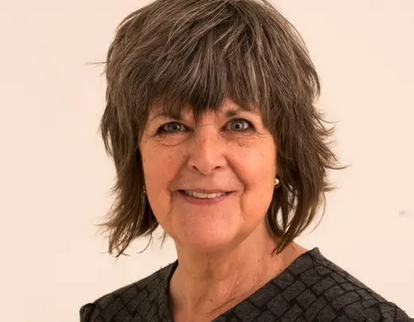
Also essential reading is Sam Marlowe (usually on iNews, occasionally in The Times), whose elegant writing is poised and polished. And Sarah Hemming, in the Financial TImes, is also a five-star writer.
THE FOUR STAR CRITICS
On the dailies front, I will always read Dominic Cavendish in the Daily Telegraph and Clive Davis in The Times (as well as his official deputy Dominic Maxwell); they are perceptive, sober and diligent writers.
The seemingly ubiquitous New York born Matt Wolf (is there a UK paper or website he hasn’t worked for, from such lesser outlets as Time Out and Broadwayworld to The TImes?) has a regular gig as London critic for the New York TImes. He files an informed and informative weekly reviews round-up for the latter, written from a distinctly trans-atlantic perspective of someone who understands the business on both sides of the pond. He was formerly long-term London critic for Variety as well, but was dismissed after failing to sufficiently like the stage musical version of BILLY ELLIOT, to then-editor Peter Bart’s displeasure. It’s an occupational hazard to clash with your editor’s tastes or friends — as I know from personal experience, when I failed to sufficiently endorse ROCK OF AGES for the Sunday Express, and my review was replaced by someone else’s (I’m sure this is unrelated to the fact that (the PR for the show had previously been the music editor of the paper).
THE THREE STAR CRITICS
Though his column is only brief, Neil Norman’s weekly entry for the Daily Express and Daily MIrror (the identical column is run by both titles) is worth searching out on Friday, when he tweets it.
Nick Curtis’s overnight reviews in the Evening Standard pamphlet (as the London daily newspaper has shrunk into) continues that paper’s longtime commitment to the theatre, but which was long held hostage to the weird prejudices of its longest-serving critic Milton Shulman (who was a blatant homophobe), followed by the equally belligerent, curmudgeonly Nicholas de Jongh (who is gay but no less contrary). Curtis was previously a deputy critic on the paper before becoming a feature and interview writer; he then returned to the critical beat after a cost-cutting saw excellent freelance critic Henry Hitchings thrown over to be replaced by him as he was already an in-house staff member.
LIke Curtis, Patrick Marmion in the Daily Mail began his reviewing career on the Evening Standard in the days of de Jongh; now he writes to Mail order, which is to say with an agenda occasionally at the forefront, but at least he is a proper theatre animal (he has also written plays that have been produced at the Arcola and White Bear).
TWO STAR CRITICS
Arifa Akbar had an undeniably tough act to follow when she was appointed chief theatre critic of The Guardian, to succeed Michael Billington after his unbroken run of 48 years in the post in 2020, during which he became the single most authoritative voice in British theatre journalism. A former literary editor of The Independent, and also a published author herself, Akbar can definitely write — but there are (inevitable) /gaps in her theatrical knowledge, which she plugs with diligent research which is sometimes too keenly displayed in the reviews. The paper surrounds her with a diverse range of other critical voices, instead of alighting on a single deputy (as Lyn Gardner used to be for Billington), which means readers have no long-term relationship with any of them to understand their tastes.
Andrzej Lukowski, theatre editor of TIME OUT since 2013 (and now more or less its sole theatre critic, though Alice Savile sometimes helps out) writes in a self-consciously hip, urban-groove that can feel tiresome, like someone trying to appear more with it than they really are. He has also been known to tweet (or rather subtweet) aggressively (full disclosure: he has blocked me).
ONE STAR CRITICS
Quentin Letts, chief theatre critic of the Sunday Times since 2019 (and before that on the Daily Mail from 2004 to 2019), is theatre’s most blatantly agenda-driven critic, which is only a part-time job for him as part of a portfolio that also sees him continuing as a parliamentary sketch writer that he used to do for the Mail and now files for The Times.
The Sunday TImes — once the home of such legends as James Agate, Harold Hobson and the indefatigable John Peter — is now a much poorer place for offering Letts’ damp, dank writing that usually stretches only to two columns in the Culture section, in which he typicallly manages only to review one or two shows a week. And if the National Theatre is involved, it invariably gets a beating — even if it is a show he loves (as I wrote here last month).
Lloyd Evans is a failed playwright (his plays co-authored with Toby Young, with whom he once shared The Spectator theatre columns, included WHO’S THE DADDY?, a play about their chum Boris Johnson and his unspecified number of babies by multiple partners) who takes out his pain on other, better and more successful theatremakers on a weekly basis. He, too, relentlessly trolls the National Theatre.
The single most frustrating outlet for me, though, remains my former longest-term editorial home THE STAGE; it’s probably difficult for me to be properly objective given my former association with them, but joint chief critic and the current reviews editor Natasha Tripney writes frequently problematic reviews (to use her favourite critical word), while a wide assortment of freelance contributors are variable, at best; I spend a lot of time being an informal unpaid copy editor letting the editor know of factual errors in the copy that appears here. (These are alway fixed as a result, but I’m never thanked for it).
Yet at the same time, THE STAGE now offers probably the most national coverage, outside of THE SCOTSMAN, of the Edinburgh Fringe, where this year contributing editor Lyn Gardner is a regular contributor. Along with Joyce Macmillan on THE SCOTSMAN, she has the longest history of reviewing at the fringe — so truly knows the territory. (Towards the end of my term working at THE STAGE, I had tweeted how Macmillan and Gardner were my go-to critics at Edinburgh, earning a rebuke from The Stage’s editor saying this was a slight on the Edinburgh reviewing team, even though I’d not actually mentioned them).
OTHER OUTLETS
The Independent and WhatsOnStage (where Sarah Crompton followed myself and Michael Coveney as chief critic) employ a range of different freelance writers, so it’s impossible to assess individual voices. Crompton has been back reviewing at Edinburgh this summer (she also writes on dance for The Observer and feature coverage for many other papers, including the Sunday Times), and is another authoritative voice; too many others, however, have little credibility.
SEE YOU ON THURSDAY
I’ll be back here on Thursday. If you can’t wait that long, I may also be found on Twitter here: https://twitter.com/ShentonStage/ (though not as regularly on weekends)
